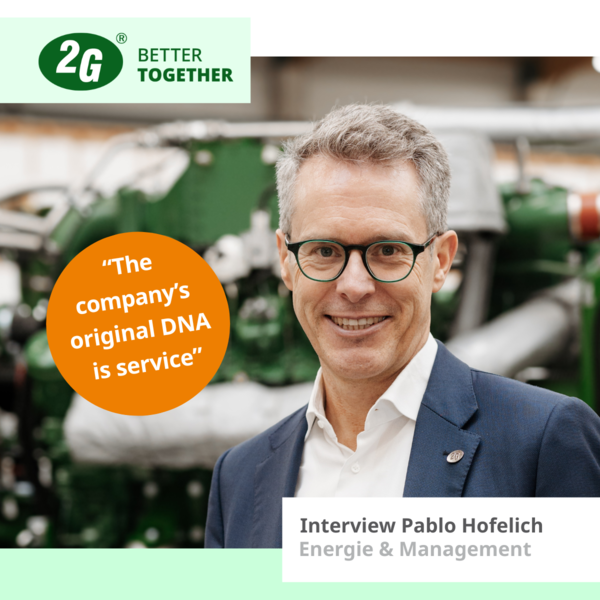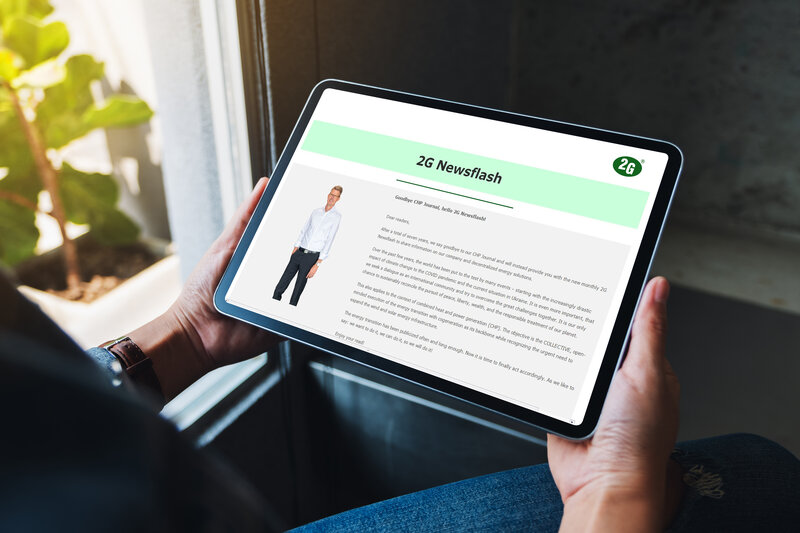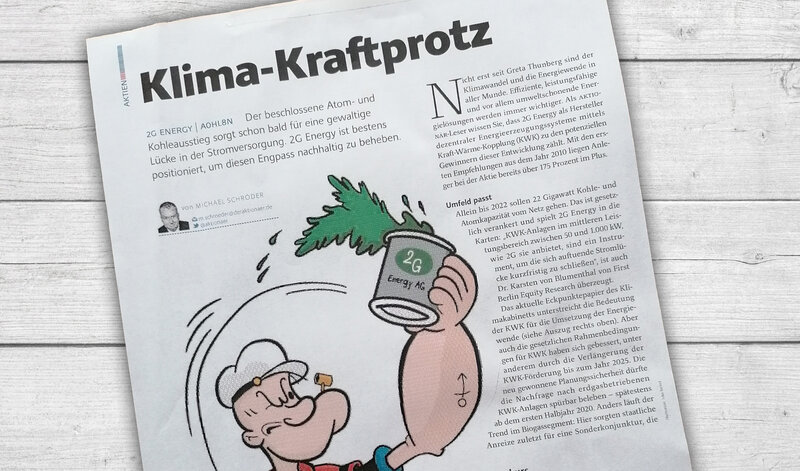"The company’s original DNA is service."
August 26, 2025

Pablo Hofelich has succeeded Christian Grotholt, the co-founder and long-time CEO of 2G Energy. In an interview with the German specialist magazine Energie & Management (E&M), Hofelich outlines his strategy.
After three decades, 2G Energy, based in Heek, Germany, has restructured its leadership. Founder and long-standing CEO Christian Grotholt handed over operational management to Pablo Hofelich in June and, as of August 1, 2025, stepped down to join the Supervisory Board. Hofelich joined the company in September 2024, initially taking responsibility for sales as Chief Sales Officer. As CEO, he aims to further develop the product portfolio and the company’s entrepreneurial culture, building on 2G’s achievement of sustained growth and strong market presence.
In an interview with E&M, Hofelich emphasized the importance of an orderly transition: “For us, an intensive handover period was crucial – and we succeeded in that.” By separating executive management and supervisory responsibilities, the company intends to clearly allocate duties and position its leadership for international growth. However, there will be no “radical change."
The leadership switch was planned far in advance. Grotholt announced early that he would focus on the Supervisory Board to leverage his experience and network. Hofelich also brings influential connections, having previously worked at ThyssenKrupp, where he led the Polysius Business Unit, directing up to €800 million in revenue and managing 4,000 employees. He offers more than 20 years of expertise from Hitachi Europe, PriceWaterhouseCoopers (PwC), and ABB. He summarizes his career as steadily “dedicated to decarbonization and mechanical and plant engineering.”
Double-digit growth targets and new markets
Another shift is a streamlined executive board. Since August 2025, the Executive Board of 2G Energy AG has had three members. Alongside Hofelich as CEO, Frank Grewe remains Chief Technology Officer (CTO) and has assumed oversight for production and procurement. Friedrich Pehle continues as Chief Financial Officer (CFO). Former COO Ludger Holtkamp stepped down from the Board in July but will advise the company.
ABOUT THE PERSON
Pablo Hofelich
CEO of 2G Energy
Pablo Hofelich, born in 1977, became CEO of 2G Energy on June 12, 2025, overseeing strategy, sales, and service. Prior to joining 2G Group as CSO in September 2024, Hofelich held international executive positions in mechanical and plant engineering. At Hitachi Power, he managed new power plant projects exceeding 800 MW per unit. Most recently, as CEO at ThyssenKrupp, he oversaw the transformation toward green solutions. He earned a degree in business administration from the University of Bayreuth (1998–2003), graduating as a Diplom-Kaufmann.
What impresses Hofelich about the mid-sized company is "that we can act quickly as a team." Looking ahead, this speed will become even more important in the volatile markets in which 2G operates. "Decision-making speed is extremely important for success." Energy markets are undergoing fundamental change, and 2G aims to help shape this transformation with decentralized, fast, and digital solutions. Under the new leadership, 2G achieved its first year of international new plant business, exceeding 50 percent of total sales, and targets annual revenue growth of around 10 percent.
“Our common goal is to establish ourselves among the top three competitors in every market in which we operate.” A key part of the strategy is further diversification of the portfolio. Beyond combined heat and power (CHP), 2G also wants to be recognized as a manufacturer of heat pumps. Stronger internationalization will help offset weaker markets, as seen in Germany's recent experience. Demand for 2G’s product range — CHP and heat pumps — is increasing in an environment of growing grid stress.
Regarding peak loads, 2G is launching a new demand-response unit this year, initially in the U.S. The system delivers up to 650 kW and is designed to support municipal utilities and industry in stabilizing the grid and covering peak demand. At the same time, 2G is investing in digitalization and AI. Together with RWTH Aachen University, the company is developing the “2G Conductor” system, which dynamically controls local energy plants based on weather data and electricity prices. The goal is an automated, economical, and decarbonized operation.
In the service segment, 2G now resolves more than 70 percent of customer issues remotely, sustaining fleet availability above 95 percent globally. Service achievements also include embedding digital solutions and boosting efficiency. Targeted acquisitions, especially in the service sector, are planned. "We are pursuing a selective M&A strategy — with strict attention to strategic fit," Hofelich emphasizes. Service remains a key growth area and will be further integrated into the overall strategy. "Service is the company’s original DNA," says Hofelich. This strong track record will continue with emphasis on efficiency, digitalization, and global expansion.
New Business Unit for Data Centers
In recent months, the Heek team has established a new business unit to strengthen its market position in the data center segment. Through the new Data Center Solutions division, standardized solutions for the data center environment will be offered in the future. “The demand for fail-safe, efficient, and sustainable energy supply in data centers is rising rapidly,” says Hofelich. “With our technical expertise, scalable solutions, and now also a dedicated organizational unit, we are ideally positioned to meet this demand.”
2G also sees further potential in the hydrogen sector. H₂-ready CHP systems could, in the medium term, make a system-relevant contribution to electricity and heat supply — particularly in reserve power plants and substations. According to Hofelich, the company is participating in project developments for peaker and reserve power plants and expects that, in the medium term, more medium-sized, H₂-capable systems will be realized.
The heat pump business is also developing in line with expectations for the market introduction phase, with demand remaining industry-driven. While 2G continued to grow abroad, domestic sales declined. For the first time in 2024, the share of international new plant business exceeded 50 percent. “Germany has been significantly underrepresented over the past two years,” adds Hofelich. However, demand in several segments is now picking up again. For instance, operators of biogas CHP plants, due to the new German biomass regulations adopted in the spring, are now aiming to expand their plants in a system-relevant manner. Yet implementation is not secured: the EU Commission has not yet granted state aid approval for the package. “We see that many operators and project developers are ready to go — but without a binding EU decision, investment security and financing foundations are lacking,” Hofelich emphasizes.
Equally important, he notes, is a timely revision of the German Combined Heat and Power Act, as also announced in the coalition agreement. Another obstacle to many projects — especially those with long-term leasing or contracting models — is still the absence of a functioning European capital market union. “Particularly with leasing solutions or service-intensive business models, which are also becoming increasingly important for us, project developers and providers in Europe are reaching their limits,” Hofelich says. While project financing in other regions of the world can be more flexible and faster, the EU lacks uniform rules and standardized instruments. “If we want to remain competitive, we need not only openness to different technologies but also modern financing structures at the European level.”
Nevertheless, 2G continues to expect a more technology-open energy policy from the current German government, also for fiscal reasons. “At the same time, we have prepared investments such as the expansion of production capacities at our Heek site, potential acquisitions in service, and further partnerships.”

